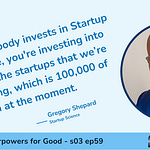
June 5, 2015 - Read the full Forbes article and watch the interview here: http://onforb.es/1HNM7I4. Subscribe to this podcast on iTunes by clicking here: http://bit.ly/ymotwitunes or on Stitcher by clicking here: http://bit.ly/ymotwstitcher. Ben Hecht, CEO of Living Cities, is an impact investor whose passion makes him more of a crusader than a financier. (Disclosure: a former client has an application for a loan pending with Living Cities.) Consider his statement to me, “Unless we ferociously change course, the majority of our citizens in 2040 will be less educated, less prosperous, and less free than our current majority, due to decades of dysfunctional systems, disinvestment, mass incarceration, and disenfranchisement of people and communities of color.” Advocating a wholistic, collective approach to addressing urban problems, Hecht says, “A new type of urban practice aimed at dramatically improving the economic well-being of low-income people faster will require all players – individuals, business, philanthropy, government, nonprofits, and academia – to focus on their part of the solution and build permanent capacity that can insure we get increasingly better results over time.” Hecht is calling for an radical acceleration to problem solving, “For too long we have been satisfied with incremental change for society’s most pressing issues, but it is time to look at the denominator and face how much progress still has to be made for these problems to be eradicated.” “There is increasingly a growing awareness that inequality of income, wealth and access to opportunity, accentuated along racial lines, is one of the key social issues of our time.If left unresolved it presents a serious threat to our society, our economy and our democracy,” Hecht notes. Living Cities is striving to play a central role in accelerating change. Hecht said, “Living Cities is on a course to do more than just imagining what’s possible. We want to work with a coalition of the willing to make the possibilities reality. In May, we took the conversation offline, convening over 100 folks in our networks—from our member institutions, to grantees, to our staff, to our social media followers, to a diversity of other thought leaders, dreamers and doers in such diverse fields as civic tech, impact investing, philanthropy, business, the financial sector, social entrepreneurship, government, and philanthropy—to participate in an active process of co-design.” Two key opportunities were identified at the summit. “One challenge we discussed at the summit was the need to create urgency without catastrophes, such as the bankruptcy in Detroit or Hurricane Katrina in New Orleans, to achieve systemic instead of episodic change,” Hecht said. “Another was that public sector leadership, resources, and talent can and must be fostered, unlocked, and optimized in order to achieve dramatically better results for low income people. Along similar lines, it was clear that there is a need for an inves tment in talent across the social sector generally,” Hecht concluded. Please consider whether a friend or colleague might benefit from this piece and, if so, share it.











